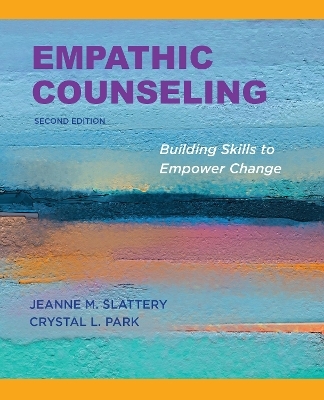
Empathic Counseling
American Psychological Association (Verlag)
978-1-4338-3122-5 (ISBN)
This is the fully updated second edition teaches the skills therapists need to understand and empathize with clients, develop strong therapeutic alliances, make accurate contextualized assessments, and facilitate positive change.
Empathy is fundamental to therapeutic change. This engaging and accessible text teaches students the clinical skills they will need as therapists to communicate empathy and help clients change. Slattery and Park begin by outlining a framework for understanding how clients think—what meaning they give to difficult situations—and how those meaning systems are connected to cultural and other contextual factors. Chapters that follow discuss how their empathic framework can be factored into assessment, intervention, ending treatment, and even case reporting and ethical concerns. Throughout they emphasize that effective therapists possess not only strong observational, listening, and critical thinking skills, but that they also put their clients’ worldviews, meaning‑making, culture, and change processes at the heart of their practice.
This second edition features new case studies, research, and clinical applications, as well as a streamlined presentation that better mirrors the process of mental health treatment. With extensive case material, reflection questions, and other practical tools, the book will help budding mental health practitioners understand and empathize with a diverse range of clients, develop strong therapeutic alliances, make accurate assessments that reflect clients’ contexts and worldviews, and facilitate positive change.
Jeanne M. Slattery, PhD, is Professor of Psychology at Clarion University. She is passionate about teaching and helping students learn to become empathic and respectful clinicians. She has also written Trauma, Meaning, and Spirituality: Translating Research into Clinical Practice and Counseling Diverse Clients: Bringing Context into Therapy. She is a licensed psychologist with a small private practice and especially works with adults and children with a history of trauma, and mood and anxiety disorders. She lives in Clarion, Pennsylvania. Visit https://jeannemslattery.wordpress.com. Crystal L. Park, PhD, is Professor of Clinical Psychology at the University of Connecticut, Storrs. Her research focuses on multiple aspects of coping with stressful events, including the roles of religious beliefs and religious coping, the phenomenon of stress-related growth, yoga, and the making of meaning in the context of traumatic events and life-threatening illnesses, particularly with cancer survivors, congestive heart failure patients, and military veterans. At UConn, she maintains an active research lab and teaches health psychology at both the graduate and undergraduate levels. She lives in the lovely village of Mystic, Connecticut. Visit https://spiritualitymeaningandhealth.uconn.edu.
Preface to the Second Edition
Part I. Introduction to Empathy and the Mental Health Professional
Chapter 1. What Is Empathy, and Why Does It Matter?
Part II. Building a Framework for Understanding People
Chapter 2. Understanding Meaning Systems
Chapter 3. Understanding Culture, Identity, and Oppression
Part III. Developing Empathic Assessments
Chapter 4. Building the Therapeutic Alliance
Chapter 5. Communicating Empathy Verbally
Chapter 6. Assessing People in Context
Chapter 7. Thinking Critically to Ensure Accurate Assessments
Part IV. Facilitating Positive Change
Chapter 8. Developing Goals and a Treatment Plan
Chapter 9. Providing Empathic Interventions
Chapter 10. Ending Treatment
Part V. Professional Issues
Chapter 11. Ethics
Chapter 12. Writing Empathic Clinical Reports
Chapter 13. Self-Care
References
Glossary
Index
About the Authors
| Erscheinungsdatum | 31.01.2020 |
|---|---|
| Zusatzinfo | many clinical and real-world case examples |
| Verlagsort | Washington DC |
| Sprache | englisch |
| Maße | 191 x 235 mm |
| Themenwelt | Geisteswissenschaften ► Psychologie ► Klinische Psychologie |
| Medizin / Pharmazie ► Medizinische Fachgebiete ► Psychiatrie / Psychotherapie | |
| Medizin / Pharmazie ► Physiotherapie / Ergotherapie ► Rehabilitation | |
| Sozialwissenschaften ► Pädagogik ► Sozialpädagogik | |
| Sozialwissenschaften ► Soziologie | |
| ISBN-10 | 1-4338-3122-8 / 1433831228 |
| ISBN-13 | 978-1-4338-3122-5 / 9781433831225 |
| Zustand | Neuware |
| Haben Sie eine Frage zum Produkt? |
aus dem Bereich


